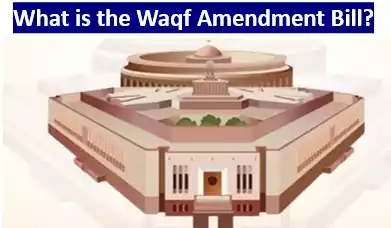What is the Waqf Amendment Bill?
Waqf is an Islamic endowment that involves donating property or assets for religious or charitable purposes while ensuring that the principal remains intact. These endowments play a significant role in supporting mosques, madrasas, orphanages, and other charitable organizations. However, to ensure the proper management and administration of waqf properties, legislative measures are necessary.
The Waqf Act, 1995, was enacted to regulate and govern waqf properties across India. Over time, various amendments have been introduced to strengthen its implementation and address concerns regarding the mismanagement, encroachments, and disputes surrounding waqf properties. The Waqf Amendment Bill is the latest legislative proposal aimed at enhancing the legal framework governing these properties.
Key Provisions of the Waqf Amendment Bill
The Waqf Amendment Bill introduces several significant changes to the existing Waqf Act. Some of the most critical provisions include:
1. Strengthening the Role of Waqf Boards
- The bill proposes to enhance the powers of State Waqf Boards, ensuring they have more control over property management, financial transactions, and dispute resolutions.
- Waqf Boards will have more authority to investigate, audit, and take action against any anomalies in waqf property management.
2. Addressing Encroachments on Waqf Properties
- Encroachment of waqf properties has been a longstanding issue. The amendment aims to introduce stricter penalties, faster eviction processes, and a transparent mechanism for handling disputes.
- Waqf Boards will be empowered to initiate legal action against unauthorized occupants and reclaim encroached lands efficiently.
3. Digitalization and Transparency Measures
- The bill promotes digital record-keeping of waqf properties to prevent fraudulent transactions and mismanagement.
- A centralized Waqf Property Management System (WPMS) will be established, ensuring better transparency and accountability.
4. Strengthening Legal Framework for Dispute Resolution
- The amendment aims to streamline dispute resolution mechanisms by establishing dedicated waqf tribunals with clear guidelines.
- It seeks to reduce prolonged legal battles over waqf property disputes by implementing time-bound resolutions.
5. Regulations on Leasing and Sale of Waqf Properties
- The bill proposes stricter regulations on leasing or selling waqf properties, ensuring that such transactions benefit the waqf and its intended beneficiaries.
- Any lease or sale agreement will require prior approval from the respective State Waqf Board and the Central Waqf Council.
Impact of the Waqf Amendment Bill
1. Ensuring Better Governance of Waqf Properties
The bill aims to improve governance and prevent corruption, ensuring that waqf assets are used for their intended charitable and religious purposes.
2. Increased Legal Protection for Waqf Assets
With stricter laws against encroachments and mismanagement, waqf assets will be better protected, benefiting communities dependent on these properties.
3. Enhancing Financial Transparency
By introducing digital records and financial audits, the bill seeks to prevent fund misappropriation and ensure that waqf donations are effectively utilized.
Challenges and Criticisms of the Waqf Amendment Bill
While the Waqf Amendment Bill brings significant improvements, there are concerns and criticisms surrounding its implementation:
1. Concerns Over Bureaucratic Control
- Some critics argue that giving excessive powers to Waqf Boards may lead to bureaucratic red tape and inefficiency.
- There are also concerns regarding political interference in Waqf Board decisions.
2. Resistance from Encroachers and Disputed Claims
- Many waqf properties are currently under litigation, and enforcing the new amendments may face resistance from unauthorized occupants and vested interests.
3. Implementation Challenges in Rural Areas
- The success of digitalization depends on proper infrastructure and internet connectivity, which could be a challenge in remote and rural areas.
- Ensuring compliance with new regulations may require additional resources and personnel, which may not be readily available in all states.
The Future of Waqf Property Management
The Waqf Amendment Bill is a much-needed reform that seeks to protect waqf properties, improve governance, and ensure financial transparency. While there are challenges in implementation, the proposed changes are expected to have a positive impact on the administration and utilization of waqf assets.
By addressing encroachments, mismanagement, and legal disputes, the bill paves the way for a more efficient and accountable waqf administration system. The long-term success of the amendment will depend on effective implementation, monitoring, and cooperation between government authorities, Waqf Boards, and local communities.
You May Like
Trending Searches Today |
ODISHA: President Droupadi Murmu To Visit Odisha Today
Tata Power: Consumer Group Protests in Bhubaneswar Over Tariff Hike Plan
World Water Day 2025: Theme and Significance, PM Modi Emphasizes On Preserving Water




